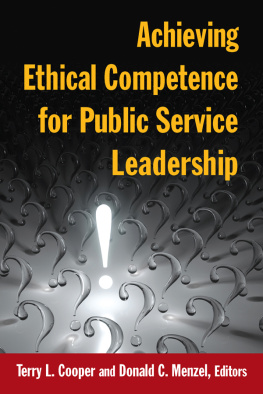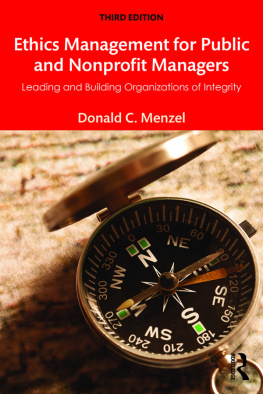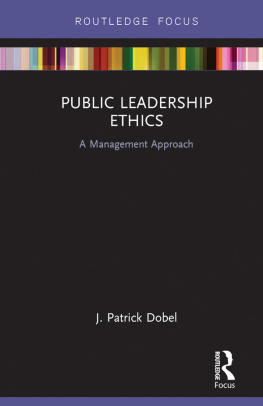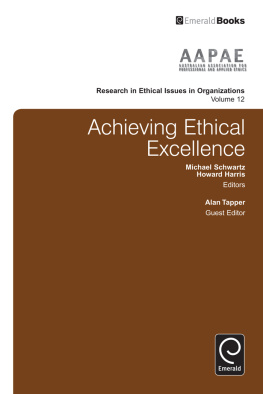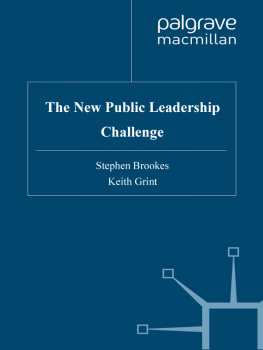Achieving Ethical Competence for Public Service Leadership
Achieving Ethical Competence for Public Service Leadership
Terry L. Cooper and Donald C. Menzel, Editors
First published 2013 by M.E. Sharpe
Published 2015 by Routledge
2 Park Square, Milton Park, Abingdon, Oxon OX14 4RN
711 Third Avenue, New York, NY 10017, USA
Routledge is an imprint of the Taylor & Francis Group, an informa business
Copyright 2013 Taylor & Francis. All rights reserved.
No part of this book may be reprinted or reproduced or utilised in any form or by any electronic, mechanical, or other means, now known or hereafter invented, including photocopying and recording, or in any information storage or retrieval system, without permission in writing from the publishers.
Notices
No responsibility is assumed by the publisher for any injury and/or damage to persons or property as a matter of products liability, negligence or otherwise, or from any use of operation of any methods, products, instructions or ideas contained in the material herein.
Practitioners and researchers must always rely on their own experience and knowledge in evaluating and using any information, methods, compounds, or experiments described herein. In using such information or methods they should be mindful of their own safety and the safety of others, including parties for whom they have a professional responsibility.
Product or corporate names may be trademarks or registered trademarks, and are used only for identification and explanation without intent to infringe.
Library of Congress Cataloging-in-Publication Data
Achieving ethical competence for public service leadership / edited by Terry L. Cooper and
Donald C. Menzel.
p. cm.
Includes bibliographical references and index.
ISBN 978-0-7656-3245-6 (hardcover : alk. paper)ISBN 978-0-7656-3246-3 (pbk. : alk. paper)
1. Civil service ethicsUnited States. 2. Government executivesProfessional ethics
United States. 3. Civil service ethics. 4. Government executivesProfessional ethics.
I. Cooper, Terry L., 1938 IL Menzel, Donald C.
JK468.E7A62 2013
172.2dc23 2012026131
ISBN 13: 9780765632463 (pbk)
ISBN 13: 9780765632456 (hbk)
In memory of Rebecca Catherine Menzel almost 21!
28 March 199110 March 2012
DCM
Contents
Terry L. Cooper and Donald C. Menzel
Annelies De Schrijver and Jeroen Maesschalck
Leonie Heres and Karin Lasthuizen
Diane L. Swanson
Richard M. Jacobs
Carole L. Jurkiewicz
Frederic G. Reamer
Jeremy F. Plant
Robert N. Roberts
Barbara S. Liggett
Donald C. Menzel and Terry L. Cooper
This book has its intellectual roots in a debate and question that are both old and new: How do we know when we, and others, are capable of acting with integrity and have confidence that our behavior meets the highest standards of our profession? In other words, what does it mean to become ethically competent and to know when that has happened or is happening? A complicated question? Maybe, but it is a very important one. It is time to face up to the challenge of achieving ethical competence for public service leadership.
Our motives for undertaking this volume are several. First, the National Association of Schools of Public Affairs and Administration (NASPAA) has moved full force toward adopting competency-based standards applicable to masters degree granting programs in public affairs and administration. NASPAA does not seek to determine what competence is or is not, but it does hold member schools responsible for cultivating, training, and teaching certain competencies (i.e., specific skills, traits, knowledge, and attitudes that are identified as leading to a state of competence). Although there is no universal exam for the field of public administration similar to those in law (the bar exam) or medicine (medical board exams), it follows that schools successful in producing these characteristics (competencies) will turn out students who have achieved some level of competence sufficient to be considered competent in practice. This approach will surely strengthen professional management in governmental and nonprofit organizations throughout the United States and abroad. Managerial competence in subfieldsfiscal and budgetary analysis, human resources, planning, the legal environment, and so onlikely will be more agreeable to the development of measureable competency-driven standards than is the case for ethics. The result could be a diminishment of ethics education and learning. We believe this volume takes a first step toward preventing such an unwelcome outcome.
A second motive for this project is the belief that while competency-driven workplaces are necessary and valuable, our understanding of the ethics culture of the workplace is often ignored or taken for granted in too many organizations. Thus the pursuit of ethical competence must go beyond the individual. We believe that the discussion of ethical competence in the pages of this volume is also relevant to the task of strengthening the ethical culture of the workplace.
The contributing authors in this volume were challenged to think widely and creatively about ethical competencehow it might be achieved and how ethical competence contributes to effective public service leadership. We charged them with taking off the gloves and venturing into territory where few others in our discipline have traveled. As the discerning reader will surely discover, the contributors accepted this charge with energy and enthusiasm.
Moreover, the chapter authors are fully aware that the discussion launched several years ago at NASPAAs conference and expanded upon in the chapters here is by no means the definitive word on ethical competence. However, the editors believe that an important milestone has been reached, and that it can be built upon in the years ahead by those who believe that ethical competence is so very important in ensuring a bright future in public governance. While much of the content in the chapters that follow is germane to public service in the United States and Europe, we are of the firm belief that our inquiries are relevant to those who advocate ethical public service worldwide.
It might be immodest to stake a claim for creative, if not pioneering, thinking about ethical competence; still, we would challenge readers to move the baton forward. At a minimum, we hope that our effort will motivate others to follow with the intent of pushing the frontier of practice and knowledge ever forward. We are neither at the end of the beginning nor the beginning of the end.
Terminology
The terms competence, competent, and competency are threaded throughout this volume. The editors understanding of these terms is the following:
Competence is a noun that can be qualified by an adjective; e.g., she has a moderate (or low or high) level of competence to run an organization.
Competent indicates that one has achieved a sufficient level of competence to meet the standards for a profession, practice, craft, or trade. The granting of a license, passing an exam, completing an apprenticeship, receiving an academic degree, or combinations of these typically certifies ones competence.
Competency is a much trickier word that has crept into our vocabulary without much consensus about its meaning; therefore, it is used in various and often conflicting ways. We would prefer to reserve this term for references to sets of specific skills, knowledge, and attitudes that are components of


